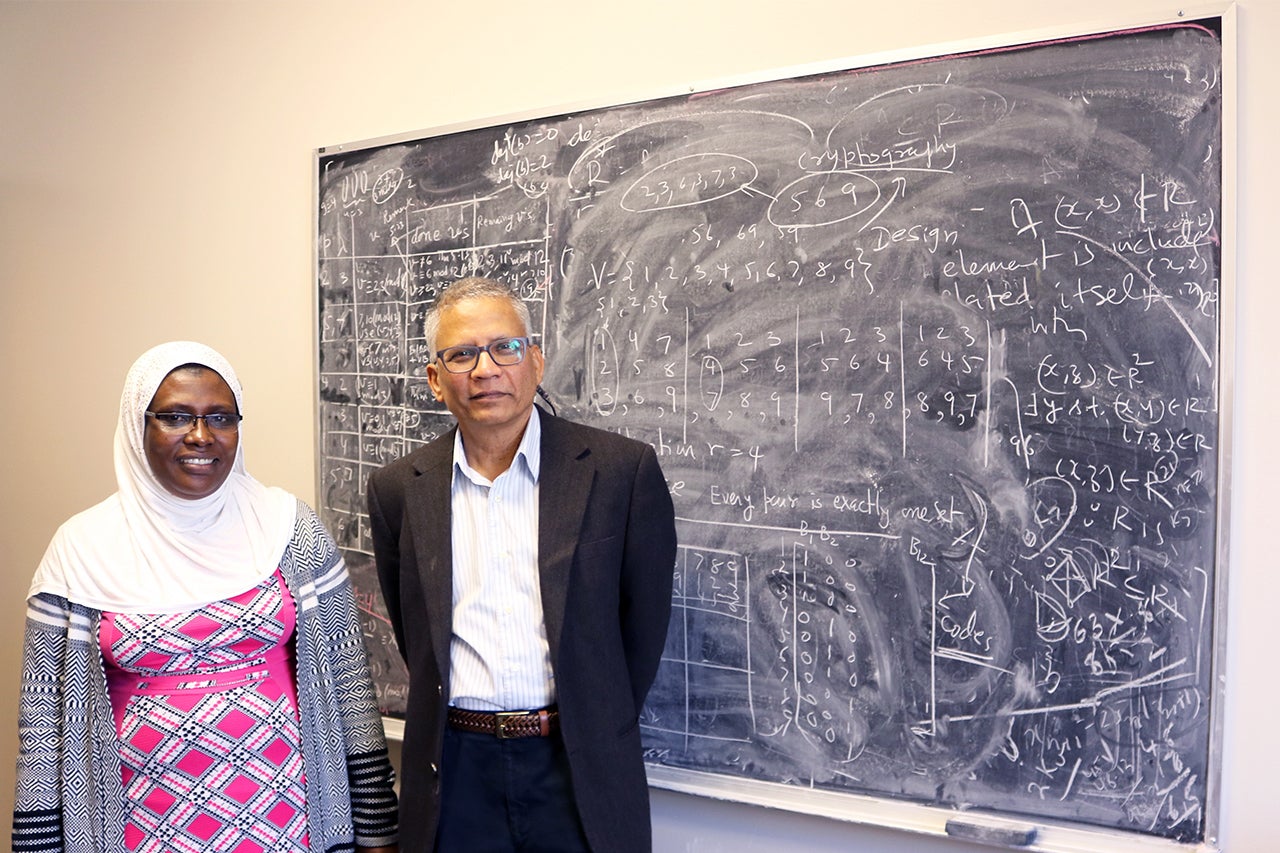When Kasifa Namyalo first met Dinesh Sarvate in 2014, she had never seen the ocean. She had never been to the United States. And she had never even considered studying something called combinatorial mathematics.
Fast forward three years and the doctoral Namyalo has now done all three. Namyalo, a faculty lecturer and doctoral student in the math department at Mbarara University of Science and Technology (MUST) in Uganda, spent the last three months at the College working alongside Sarvate on her dissertation in combinatorial design theory. In her free time, she observed Sarvate’s undergraduate classes in discrete structures and statistics. She also co-authored a paper with Sarvate and CofC student Blaine Billings, which she presented at the MCCCC (Midwestern Conference on Combinatorics and Combinatorial Computing) this fall at the University of West Georgia in Carrollton, Georgia. And a few weeks ago, she visited Folly Beach, where she finally got to see the ocean.

Doctoral student Kasifa Namyalo spent a semester at CofC this fall studying as a scholar-in-residence.
“The experience has been so wide and open for me,” says Namyalo, who returned to Uganda this week. “It has been so nice being in the United States for the first time, meeting different people from different backgrounds.”
As a Fulbright scholar and math professor at CofC, Sarvate is expanding the College’s reach to international students through his work with master’s and doctoral students at two universities in Uganda. He met Namyalo while studying at MUST during the 2014–2015 academic year as part of a Core Fulbright U.S. Scholar grant to work in the math department on curriculum development and teacher training, specifically research. When he returned to work at nearby Bishop Stuart University as a Fulbright specialist for the 2016–2017 academic year, Sarvate continued to work with Namaylo as her doctoral adviser.
Through MUST and an African Development Bank-Higher Education in Science and Technology grant, along with the support of CofC math department Chair Bob Mignone and Michael Auerbach, dean of the School of Sciences and Mathematics, Namyalo traveled to Charleston in August to finalize her thesis with Sarvate in combinatorial design theory, an area in mathematics that deals with sets and systems of numbers (think computer coding, cryptography, computer engineering, statistics and Sudoku).
“There is a shortage of Ph.D. supervisors in Uganda,” says Sarvate, noting that he is also still working with a Ph.D. student at Bishop Stuart University. He has also connected Caroline Hunt, professor emeritus of English, with Bishop Stuart, where she is advising a Ph.D. student on her dissertation in Young Adult literature. “Even when master’s students want someone to advise them, it’s hard to get someone to work with them on a regular basis.”
After spending the semester at CofC, Namyalo, who is the first woman in her family to get a college degree, is within a year of submitting her dissertation to complete her Ph.D.
“My parents, husband, and children: They really support me,” she says, noting that completing her doctoral degree will allow her to be promoted to a senior lecturer and, eventually, perhaps a full professor.
Mentoring international students, says Sarvate, offers an opportunity for the College to reach students in corners of the world it wouldn’t otherwise reach, improve educational opportunities for students in those countries and to attract talented students from across the globe to CofC. As an example, Sarvate noted that he and Namyalo designed a course in design theory during his time at Mbarara University, and Namyalo now teaches it there.
“Our college wants to attract students from national and international communities, and one way to help achieve this goal is to visit and showcase the College internationally,” he says, adding that another benefit specifically to working with doctoral students is that it pushes professors to pursue more challenging research and publication of those projects. “What is more important for me is that I believe if I train one teacher properly, then I have made an impact on several generations of students. That’s what motives me to go where I feel I can make a difference.”




